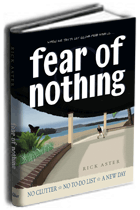Yesterday, as every day, we saw examples of the difficulty of planning. The big events of the day turned out not to be the ones that were loudly predicted the day before. Predictions are based on guesses and hidden assumptions and often turn out to be wrong. The future is unknown, so how can you ever plan anything?
The farther a plan reaches, the more unlikely it is that reality will follow the plan. These are 7 tips for reducing the risks of planning by reducing its scale:
- Plan small. Instead of trying to plan the whole future of everything, plan just one thing, or just a few.
- Plan from what you know. Don’t put much stock in plans based on rumors and guesses.
- Plan for the near future. It is easier to plan for today than for tomorrow, so plan for today first.
- Plan actions. Results come from actions, so plan actions. Planning without action creates all the risk that is inherent in planning, but without any possibility of reward.
- Plan your own actions. It is hard enough to plan for yourself, harder still to plan for other people. For the same reason, don’t put much reliance on other people’s plans for you.
- Change plans often. Be prepared to reconsider your plans when the predictions and assumptions they are built on turn out to be incorrect. This is something that is sure to happen on a daily basis, so be ready for a change of plans around any corner.
- Don’t take plans too seriously. A year from now, most of your plans will be forgotten, but people will remember some of your actions and results. Put the emphasis on action rather than planning, and you will get more results.
Despite what you may have heard, it is not a good idea to “stick to” a plan. Imagine having a plan glued to your forehead, and you’ll immediately see the problems with this approach. The people who tell you over and over again to “stick to the plan” are people whose whole lives are one long series of “Oh, no, my plans are falling apart again.” Instead of struggling to follow one flawed plan after another, what they need to do is make smaller plans, more often, at least until they learn how planning works. Sticking to a plan should not be confused with perseverance. Perseverance is about continuing to take action, but the longer you stick to a plan after it has failed, the harder it is to take action.
Planning is a necessary part of life, but planning is also necessarily risky. You reduce the risk of planning when you can plan closer to where you are right now, using plans that are quick, simple, and obvious. It is the big plans, the plans that people labor over for weeks, that represent the most risk. It is awkward when those plans fail, and more than that, most of the work that goes into the big plans turns out to be a waste of time when events don’t go as planned. Today is a new day. Make a new plan.



No comments:
Post a Comment